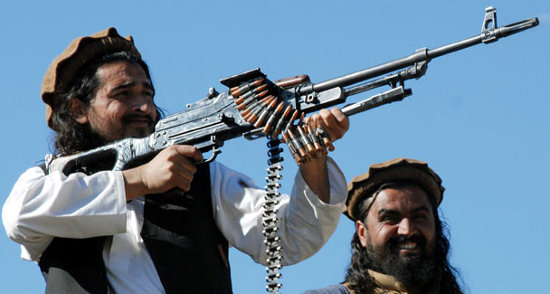|
|
|
Hakeemullah Mehsud, left. AFP photo. |
An unnamed Taliban commander said that the group will provide “proof” that Hakeemullah Mehsud is alive and survived the Jan. 14 airstrike carried out by US forces. From The Associated Press:
A close aide to Mehsud called the report of the militant chief’s death “government propaganda” and said he was “doing well.”
“We will try in a day or two to give you proof that he is alive,” the senior Taliban commander told The Associated Press by telephone from an undisclosed location. He spoke on condition of anonymity for fear of government retribution.
[Warning, gratuitous mention alert.] Also, intelligence sources contacted by The New York Times and The Washington Post are at odds with sources whom I spoke with yesterday morning:
The New York Times and the Washington Post quoted anonymous U.S. officials as saying Sunday they were more than 90 per cent certain Mehsud had died. The Long War Journal, a U.S. Web site that closely monitors the American missile campaign in the northwest, quoted U.S. intelligence officials as saying there was no indication he had been killed.
No arguments here. Different assessments on Hakeemullah’s status seem to be floating around. For once, the Pakistani government and military are being conservative while US officials are being more assertive. This is all part of the fog of the Predator war, which I discussed just three days after the report that Baitullah Mehsud was killed in August 2009.
The Associated Press article cited above rightly noted that sources in the tribal areas are thin to nonexistent. We can’t even be 100 percent certain if everyone on this list of senior al Qaeda and Taliban leaders killed in US strikes in 2004 is actually dead. In fact, the best evidence we have that they are dead is when the Taliban or al Qaeda tells us that the leaders or operatives are dead.
Our best indication of Hakeemullah’s status will come from the Taliban themselves, and not from US or Pakistani intelligence officials. If the Taliban release an audio or video tape, we’ll have confirmation he is alive; if not, we’ll continue to wonder if he is dead.
One reason the Taliban are cautious about quickly releasing audio or video after each and every claim of the death of a commander is because they are fearful the tape will be used to trace back to their location. US intel wants the Taliban to hastily release tapes. And the Taliban know this.
Are you a dedicated reader of FDD's Long War Journal? Has our research benefitted you or your team over the years? Support our independent reporting and analysis today by considering a one-time or monthly donation. Thanks for reading! You can make a tax-deductible donation here.









4 Comments
I wonder if the Taliban would ever claim someone was dead and they really weren’t. No one is more dangerous than someone supposedly dead.
Nothing is true without a corpse I guess…
Spooky, I have not seen any evidence of this, from Taliban or al Qaeda. Baitullah was the only incident of the Taliban being deceptive that I can trace. And people I speak to say Baitullah wasn’t immediately killed in the strike but died days later.
Spooky,
Unless I’m mistaken, for a long time we were led to believe that Jalaluddin Haqqani was deceased. It wasn’t until some time around April of 08 that he released a video confirming that he was indeed alive.
For as much as our own pride would like to believe that these guys are savage simpletons is caves, they posses a keen sense of strategy and deception that has not yet been fully appreciated by most.
I note that a promise-to-prove-something-in-the-near-future is often used as a substitute for REAL proof by Pakistanis: you’re supposed to believe in the assertion until the proof comes – even if that never happens. I suppose this is an effective technique if the audience is short-sighted and not properly skeptical of such tricks.